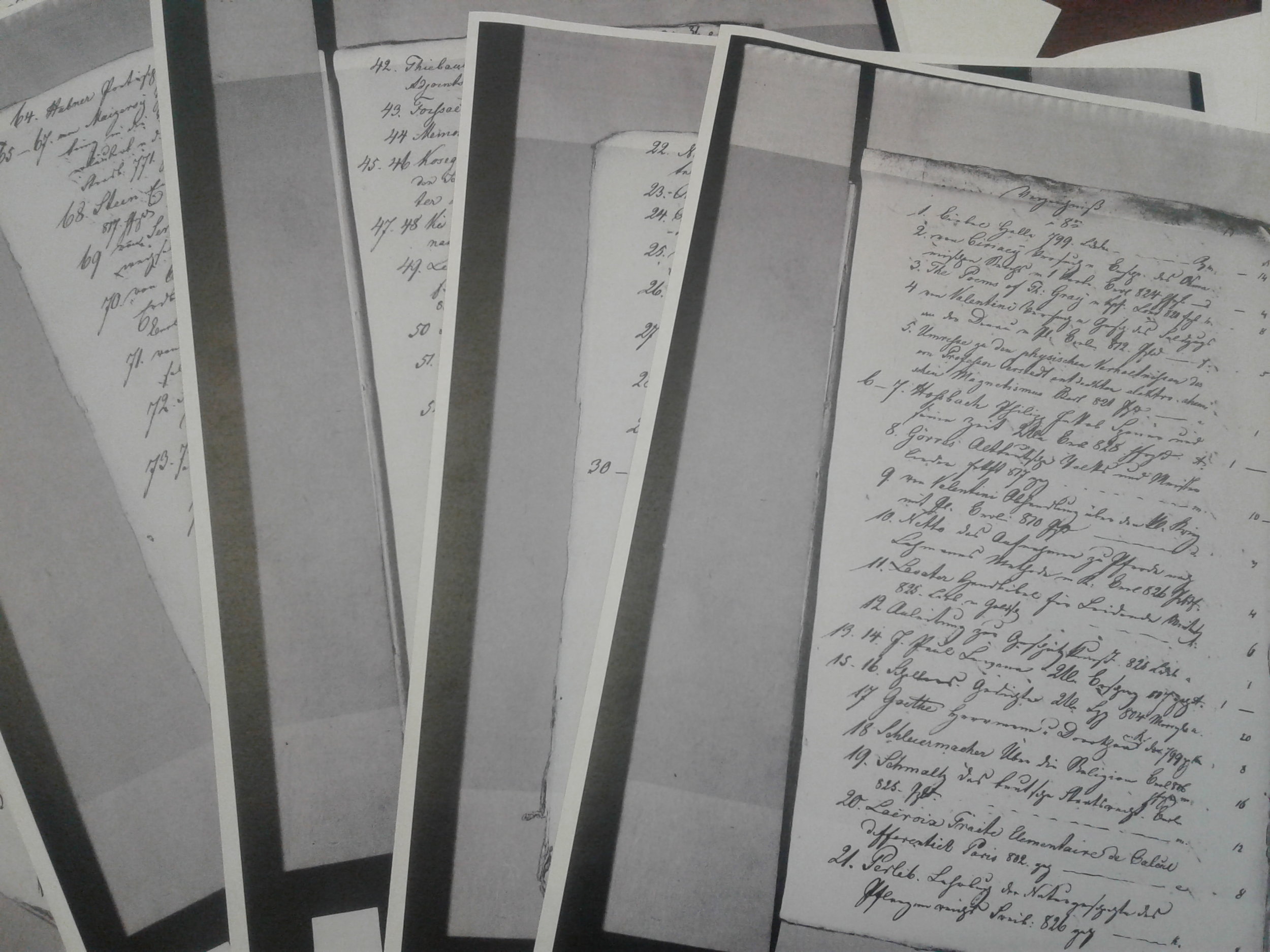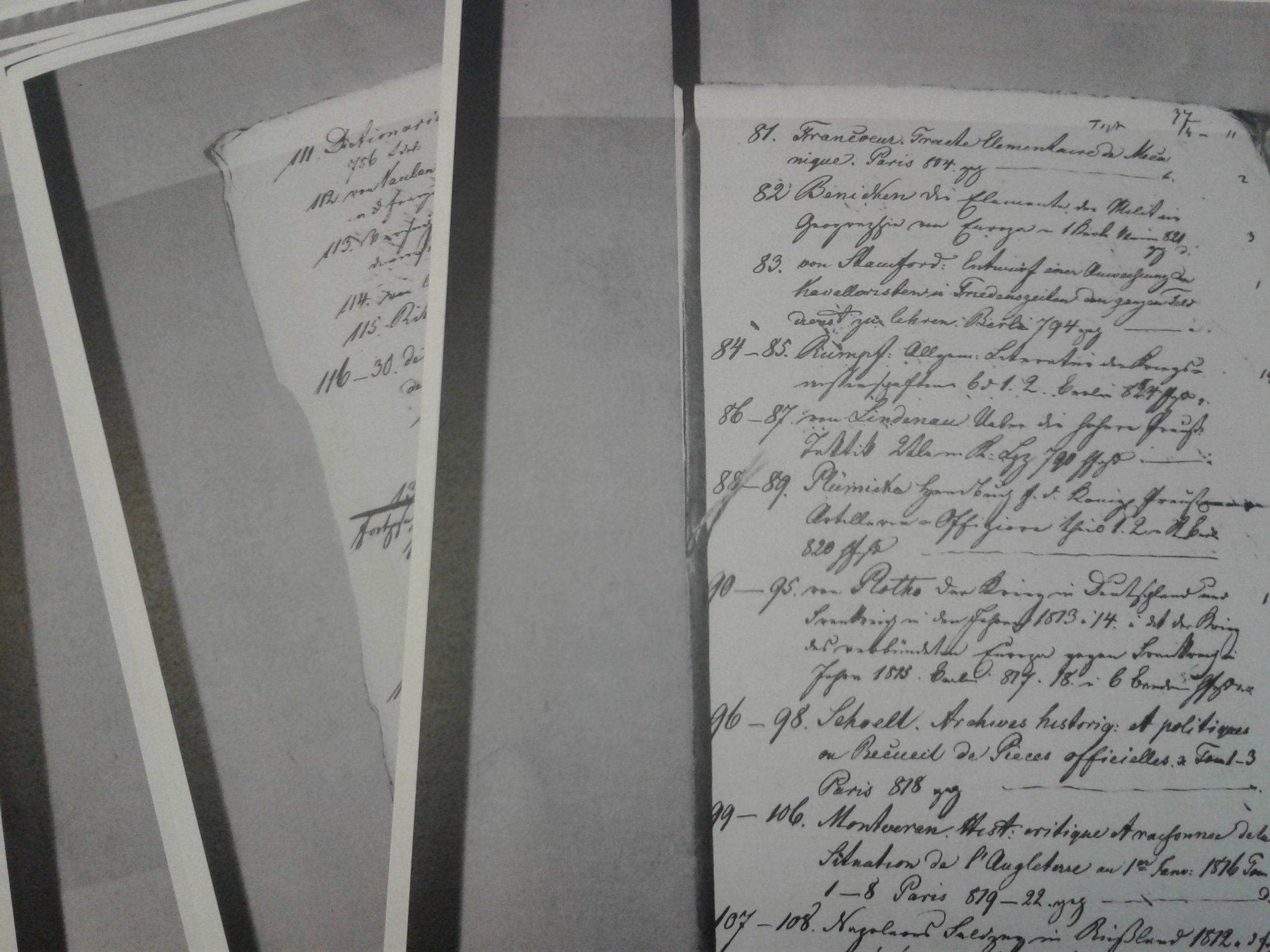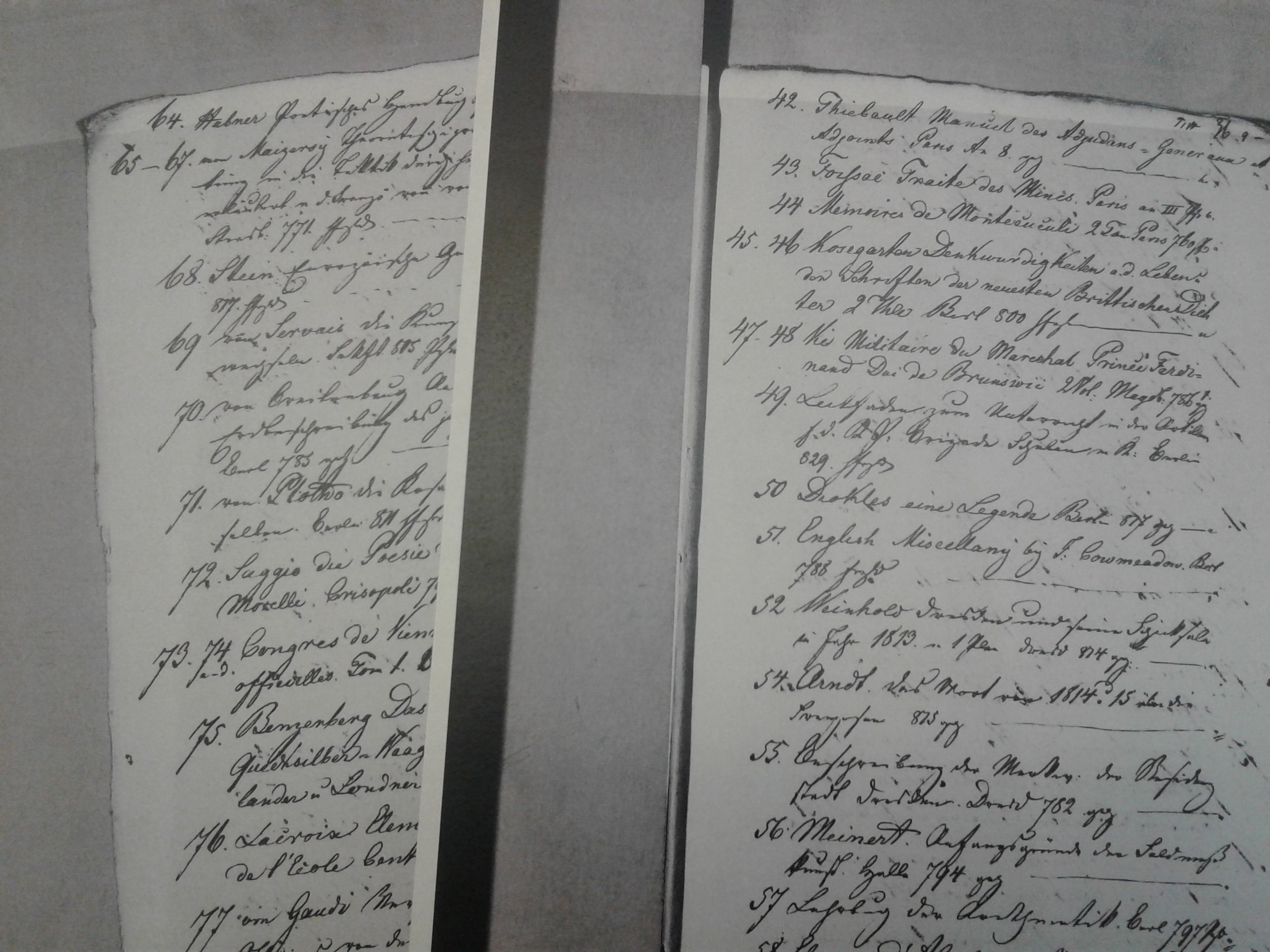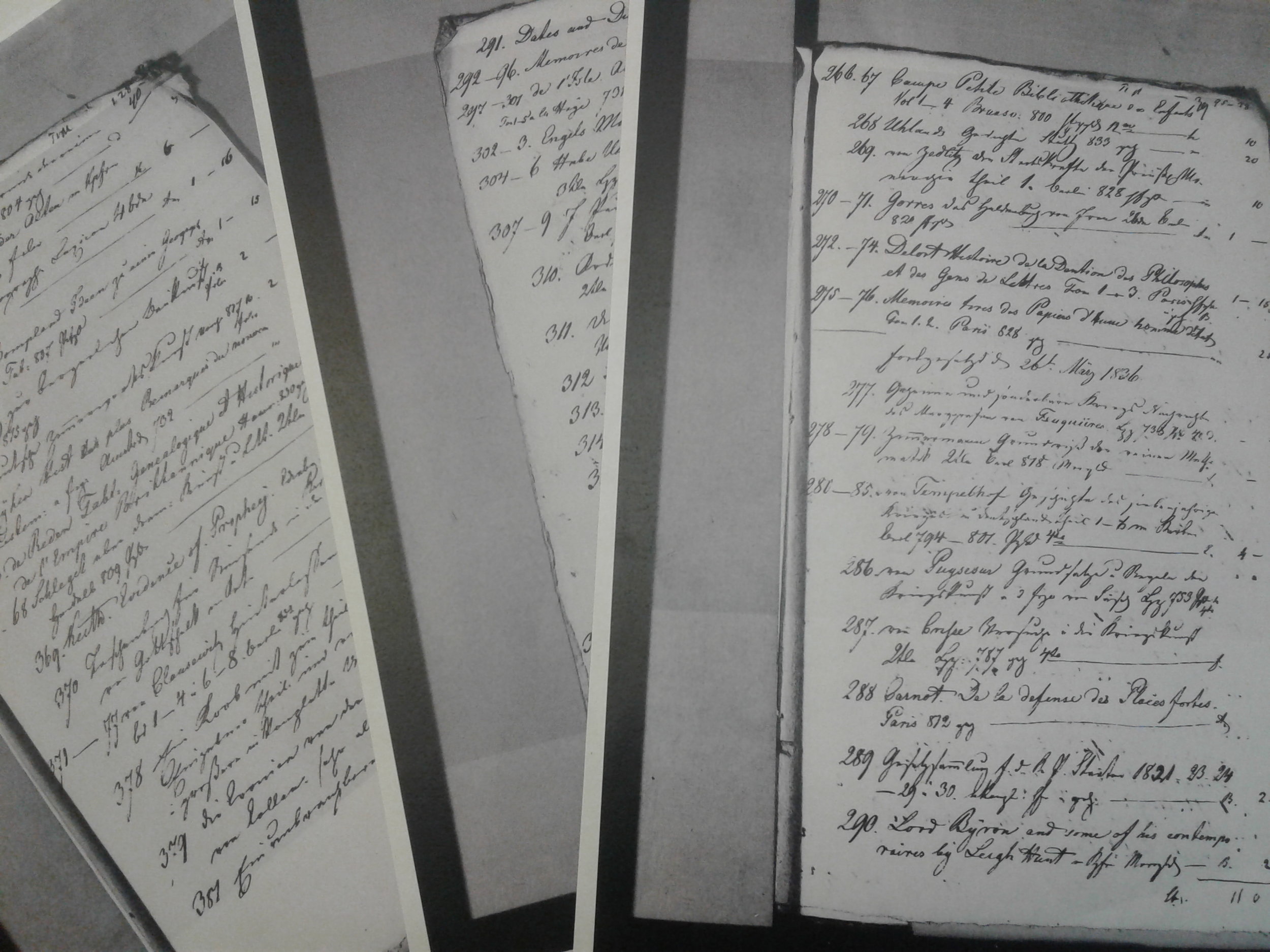Carl von Clausewitz is considered by many the west’s preeminent military theorist, and within professional military education his seminal treatise On War is extensively cited and studied. With so much attention, it might be supposed that we know all there is to know about his life and work. In reality, however, Clausewitz’s intellectual path, especially in his later years, remains somewhat of a mystery.
Marie von Clausewitz (Wikimedia)
On War is a constant fixture in the Chief of Staff of the Army’s Reading List, but, remarkably given this interest in him, our knowledge about the books Clausewitz read and considered relevant for his work is rather opaque. Scholars usually study the letters to his wife Marie as the main source for insight into his cerebral path.[1] In this regard, the discovery of the complete correspondence between the couple in 2012 enhanced enormously our knowledge about Clausewitz’s intellectual environment.[2]
Unfortunately, in the years 1816-1830, exactly the time when Clausewitz was wrestling with the ideas behind and the composition of On War, the couple spent most of their time together, exchanging very few letters. Clausewitz’s correspondence with his close friend Field Marshal August Neidhardt von Gneisenau from the same period is also rather sporadic. The military thinker occasionally wrote to his brothers, but these letters concerned mostly family matters, and we are left with far fewer primary sources than we might like.[3]
Equally regrettable is the fact that no personal library has endured; not even the majority of On War’s manuscripts survive. The book collections of great minds reveal influences, interests, and interactions. The replication of George Washington’s personal library at Mount Vernon in 2013 is perhaps the most famous and revered example. In the wake of this bibliotheca, numerous articles emphasized how much more there is to learn about America’s founding father (see here, here and here). The collection’s titles demonstrate Washington’s broad intellectual interests and enormous drive for self-improvement.
Books that belonged to George Washington. (Win McNamee/Getty Images)
A Discovery
Students of Clausewitz now have a new and exciting source of information. Scholars from his home town of Burg bei Magdeburg (Forschungsgemeinschaft Clausewitz-Burg e.V.) recently discovered Marie von Clausewitz’s last will and testament in the Brandenburg State Archive in Potsdam.
The document bears the stamp of 16 May 1814. This means she drafted it shortly before leaving Berlin to rejoin Clausewitz in the Rhine camp where he, as chief-of-staff for the Russo-German Legion, was staying after the defeat of Napoleon Bonaparte.[4] In 1831, when Clausewitz served as chief-of-staff for Prussia’s Army of Observation on the eastern border and fearing the approaching cholera epidemic, Marie desired to revise her testament, but she never did.[5] Neither did she change the document when Clausewitz suddenly died in November 1831. The couple had no children, so when Marie passed away unexpectedly in January 1836, the court was called to assess the estate. Meticulous Prussian bureaucrats wrote long lists of household items, books, and assets the couple owned and composed extensive procedural discussions regarding which relatives should receive which elements of the estate. The folders consist of over 400 well-preserved pages of text.
Scholars are yet to study Marie von Clausewitz’s extensive testament in detail. One of the most remarkable finds, however—and also one of the easiest to decipher—is eleven pages containing a catalogue of the 380 volumes in the library of Carl and Marie. An edited list more accessible to examination and analysis than the original text (containing the original title of each work, its English translation, and, where possible, links to the publication in the original and in English translation) is available here. Below, individual titles and volumes are numbered according to their position on this list for easy reference. The catalog created by the Prussian bureaucrats does not appear to be in any particular order, and we have retained the sequence from the original catalog in the edited list. As the testament is transcribed and analyzed, and as more information and more translations become available, we will continue to update this list.
This article offers a brief overview, first impressions, and some context concerning the Clausewitz’s library.
Interpreting the Library
The first and most noticeable observation is how short the list is—only 380 volumes. Marie von Clausewitz’s grandfather, the illustrious Prime Minister of Saxony Heinrich von Brül, once owned a legendary collection of 62,000 books.[6] George Washington’s library contained some 1,200 titles. Both Brül and Washington were wealthy men, however, something Clausewitz most certainly was not. Yet even the reliance only on his government pay could hardly explain the the small size of the recorded library.
It is possible, of course, that Marie gifted some of Clausewitz’s books to friends and relatives after his death in 1831, a common way to remember a beloved person in this period. For example, Marie’s cousin Carl von Brühl, who cared for her in her last days, bestowed on close friends and family some of her belongings in 1836. Among the gifts were books from her library (although we don’t know the titles).[7]
Another explanation, hinted at by Peter Paret, is that between 1818-1830 Clausewitz, as director of the Kriegsakademie, literally lived down the hall from one of the greatest military libraries in Europe.[8] So, perhaps he had no need to purchase every book he wished to read or needed for his scholarly work.
The list found at the Brandenburg State Archive also does not include many titles mentioned explicitly in Marie and Carl’s correspondence and other papers. For instance, in 1815 he reported to Marie his impressions of the memoirs of Marchionesse de La Rochejaquelein on the rebellion in Vendee.[9] Clausewitz also wrote a commentary on the published secret correspondence of Madame de Maintenon and Princess des Ursins.[10] And he referenced Dmitry Boutourlin’s Histoire militaire de la campagne de Russie en 1812 in his own account of the 1812 Campaign in Russia.[11] None of these books is among the cataloged titles. Perhaps Clausewitz borrowed them from friends or libraries; perhaps he once owned them, but they were no longer a part of the estate on Marie’s death; maybe there is some other explanation. Then there are titles we know the couple almost certainly owned, such as Alessandro Manzoni’s novel Betrothed—Clausewitz asked Marie to send it to him while stationed in Posen in 1831—but this title is also missing from the newly discovered catalog.
Portrait of Antoine-Henri Jomini by George Dawe (Hermitage Museum/Wikimedia)
Also of interest, the personal library does not contain any title written by Clausewitz’s contemporary, Baron de Jomini. Considered the former’s great rival in the realm of strategic studies, Jomini was a prolific and bestselling author. His Traité de grande tactique (1803) was widely studied and underwent various editions. As Christopher Bassford reveals, Clausewitz extensively studied this work and later on the pages of On War, criticized Jomini.[12] The absence of these works in the private library is a fascinating fact yet to find its explanation.
It is important to emphasize that the book collection could be considered equally curated by Marie von Clausewitz, and may, in fact, tell us as much about her as it does about Carl. While the library contains a number of professional military works, titles corresponding to her interests make up a significant part of it as well (more on this later). A politically active woman and an intellectual in her own right, Marie often encouraged and sometimes openly pushed her husband to explore Romanticist literature, arts, and politics. She was a popular member of Berlin’s literary salons and a friend of many famed artists of the day. As a young officer from the provinces, Clausewitz embraced Marie’s tutelage and, throughout his life, valued the chance to broaden and challenged his perspective.[13]
The Contents and What They Suggest
General Gerhard Johann David von Scharnhorst, painted by Friedrich Bury (Wikimedia)
Not surprising for an officer of the Prussian Army, military publications constitute a significant number among the volumes. Some of the more interesting titles include Vauban’s classical treatises on fortifications and sieges (43 and 112); Johan von Ewald’s book on light infantry tactics (25); Henry Lloyd’s history of the Seven Years’ War (last volume written by G.F. Tempelhof, 280-285); Montecucili’s memoirs (44); a study of Maurice de Saxe (59-60); Lazare Carnot’s textbook for engineers (288); George de Chambray’s account of Napoleon’s Russian Campaign in 1812 (107-108); several of Georg Wilhelm von Valentini’s military works (4 and 9); Phillippe Henri de Grimoard’s treatise on general staff (247); and of course the field manual written by his mentor, Gerhard von Scharnhorst (79-80). Clausewitz was, as one would expect, a student of his profession.
Just as one would expect from a graduate of the Prussian Kriegsakademie—in which science and math made up a significant part of the school’s curriculum—the personal library contains many titles on math, geometry, physics, and astronomy.[14] As the cataloged titles reveal, science remained one of Clausewitz’s lasting interests. In later years, he read about geography (most noticeable are Alexander von Humboldt’s works, 316 and 362, but also see 22, 68, 82), mineralogy (37), calibration (75), chemistry (181-183), cartography (22), and several works on botany (21, 307-309). Paul Erman’s treatise on electromagnetism from 1821 (5) might even have been one of the inspirations for Clausewitz’s famous metaphor about how passion, chance, and reason act as three magnets constantly reshaping the character of a war.
Clausewitz argued, there should be balance with humanities and broader knowledge. Only in this way would the Kriegsakademie create logical and comprehensive thinkers able to cope with uncertainty on battlefield and the challenges of dealing with real people.
This raises a fascinating point regarding Clausewitz and his view of the sciences. Later in life, just before assuming the position of director of his old school, Clausewitz criticized the overemphasis of math in military education. In a memorandum to the Minister of War, Hermann von Boyen, from 1819 he wrote that mathematics remains the cornerstone of officer education. However, Clausewitz argued, there should be balance with humanities and broader knowledge. Only in this way would the Kriegsakademie create logical and comprehensive thinkers able to cope with uncertainty on battlefield and the challenges of dealing with real people.[15] It was a stance, as the further analysis of the personal library suggests, Clausewitz had taken to heart.
In addition to the interesting but perhaps expected insights for students of Clausewitz described above, the list harbors some surprises. For example, his interest in non-Western ways of war, statecraft, and societies is well worth noting. The library gives evidence in Ciriacy’s exploration of the Ottoman Empire and its military (2), books on the history of the Cossacks (71), on the geography of Crimea (70) and Africa (115), on the European colonization of East and West Indies (251-254). Particularly interesting is the copy of the Persian national epic Shahnameh (“The Book of Kings”) by Firdusi (270-271), published by Clausewitz’s old acquaintance from Koblenz, the publicist Joseph Görres.
The book on the art of correspondence (69) most certainly belonged to Clausewitz. Marie did not need it—from an early age she was trained how to write elegant letters, a skill considered crucial for an aristocratic woman.[16] As a young officer, Clausewitz, on the other hand, was painfully aware of his lack of social pedigree.[17] The year the book on correspondence was published, 1805, also matches the period when he, as a recent graduate of the Kriegskademie and aide-de-camp of Prince August (a cousin of King Friedrich Wilhelm III) was stationed in Berlin. Clausewitz entered the capital’s cultural and political scene, and he fell in love with Marie, a woman beyond his station. Self-aware and ambitious, the brevet captain did his best to fit within the refined social circles, among other things by improving his letter writing skills.
After the end of the Napoleonic Wars in 1815, Clausewitz increasingly read books on statecraft (19, 96-98, 255-259, 366, 131), political history (99-106, 131, 157-162, 172-175, 269, 275-276), international and domestic law (289 and 312), and diplomacy (73-74, 116-130). There are also titles on commerce (26), economy (255-259), and taxes (35). The 1820s were also a time when he worked intently on the development of his military theory in On War. The volume and breadth of these titles suggest Clausewitz’s groundbreaking idea about war’s political character and the interaction between politics and war was not a sudden hunch inspired by genius. It came, rather, as the product of a long process of research and reflection.
In the note from 1818 about the genesis of On War, Clausewitz revealed that he initially modeled his writing after Montesquieu’s “short, precise, compact statements.”[18] The library actually contains a copy of the French philosopher’s complete oeuvre, all twelve volumes (231-242). Clausewitz’s interest in Johann Gottlieb Fichte’s ideas is also well documented (185 and 250). And the catalog also contains a philosophical work on Erasmus (191).[19]
Johann Wolfgang von Goethe at age 79, painted by Joseph Karl Stieler (Neue Pinakothek/Wikimedia)
Just as numerous and extensive are the literary titles. Carl and Marie’s love for the classics of Johann Wolfgang von Goethe and Friedrich Schiller is well-known (15-16, 17, 208-214), yet the sheer volume makes clear how much poetry and literature meant to the couple. From 380 volumes altogether in this very personal library, fully 100 are literary works. From Homer (262-265) and Hesiod (248), through Shakespeare’s dramas (192), Lord Byron’s poetry (180 and 249), Thomas Moore (132), and Novallis (260-261) to the complete works of Johann Gottfried von Herder on literary theory and history (318-352). The presence of Madame de Staël’s writings (61-63) would not surprise Clausewitz’s biographers, as he spent time in her home in Coppete on Geneva Lake in 1807 and admired her vivacious mind.[20] There, Clausewitz also met the poet and critic August Wilhelm von Schlegel, hence the personal interest in his published lectures on literary theory from 1809-1811 (367-368).[21]
Some of the books, of course, are far from masterpieces but examples of the literature that caught the spirit of the time and the interest of the masses. Today, authors like Susanne von Bandemer (114), and Frederic Reynolds (133), and the poetry of the medievalist and politician Ludwig Uhland (268) are known mostly to experts. Yet the presence of these works in the personal collection confirms the impression that the couple read widely and were deeply immersed in the cultural debates of the time.
An observant reader of the cataloged titles will notice many of them are in English. In all likelihood, most of these books were acquired by Marie. Her mother, Sophie von Brühl, was the daughter of a British diplomat, and Marie was fluent in English and close to many English-speaking expats and diplomats living in Berlin, most notably the future U.S. President, John Quincy Adams, and his wife Louisa.[22] Clausewitz once harbored ambitions to become Prussia’s ambassador in London, but whether he had learned to speak English well, remains unclear.[23] Most likely, Marie was the passionate fan of Lord Byron’s poetry. Just like the poet, she was also a supporter of Greek independence movement.[24]
Based on the publication dates, Marie almost certainly acquired some of the books after her husband’s death (27, 179, 202-207, 186-190, 268,369). These are mostly literary works—Schiller, Rahel von Varnhagen’s published letters, poetry. Marie also kept one copy of Clausewitz’s published Posthumous Works (371-377). Just few weeks after his death, she prepared the unfinished manuscript of On War for public release. Starting 1832, the seminal treatise appeared as the first three volumes of Posthumous Works, followed by a number of his campaign studies. The private library contains a copy of parts 1-4 (On War and The Campaign of 1796) and 6-8 (Part II of The Campaign of 1799, The Campaign in Russia, The Campaign in 1813, The Campaign in 1814, The Campaign in 1815). Parts 9-10, containing various campaign studies and edited by the couple’s close friend Carl von der Gröben, came out after Marie’s death.
Remarkably, the Prussian bureaucrats cataloging the titles noted that this copy in the personal library bore markings. It is a fascinating detail to ponder: What did Marie think about or wish to change in her husband’s lifework after it was published? Just as with the rest of the library, unfortunately we do not know the fate of this copy of Posthumous Works. This is a question Marie’s testament has yet to answer.
These works, perhaps, hint at Clausewitz’s growing interest in the matters of just war and ethical conduct.
The library also contains a significant number of religious titles. This is something of a surprise, as neither Marie, nor Carl appeared particularly pious in their writings. Clausewitz, of course, was the grandson of a well-respected Lutheran theologian, Benedikt Gottlieb Clauswitz. Therefore it should perhaps not be quite so surprising that spirituality and theology belonged to his intellectual interests. The 1820s were also a time of pietistic revival in Germany and many of the couple’s friends and acquaintances were prominent members of this circle (e.g, Carl und Selda von der Gröben, Leopold von Gerlach, Anton von Stolberg, Princess Marianne of Prussia).[25] The Clausewitz couple, intellectually curious and part of Berlin’s vibrant social scene, might have read the famed works of the time. Another possible explanation is that Marie, after Carl’s sudden and tragic death in 1831, sought comfort and hope in religious literature.[26] In any case, this remains another aspect to explore.
This surprising find could also encourage those wishing to study On War and Clausewitz’s ideas from an ethical perspective. Some of the religious titles—Schleiermacher (18) and Martin Luther’s essays on the Old Testament (311), for instance—explore momentous moral questions of good and evil, personal responsibility and state authority, values and society. These works, perhaps, hint at Clausewitz’s growing interest in the matters of just war and ethical conduct. Based on the research available to them, scholars have already commented on On War’s moral undertones (for instance James M. Dubik, and Paul Cornish).[27] The newly discovered library suggests there is much more to explore on the topic.
Perhaps the most curious find in the Clausewitz catalog is a cookbook, Carl Friedrich von Rumohr’s The Essence of Cookery (published under the pseudonym Joseph Koenig, 28). In their writings, neither Carl, nor Marie displayed a particular interest in gourmet cuisine. Born and raised at the court, Madam von Clausewitz certainly had never touched a griddle in her life.
Rumohr, however, did not write a typical cookbook with recipes for various dishes. There are, in fact, no recipes for making pudding or instructions for grilling a steak, no prescriptions for how much salt, pepper, and flour one should add. The Essence of Cookery is rather a meditation on the nature of food and the character of various cuisines. The book explores food preparation and consumption within their broader cultural and historic context. It provides its readers with basic knowledge, while encouraging them to explore the world around them. Does this view sound familiar?
Conclusion
It would be too simplistic, to attribute the inspiration for On War to one book, especially a cookbook. There is no evidence that Clausewitz, in fact, read Rumohr’s work; The Essence of Cookery might have been gifted to the couple, only to gather dust in their library or purchased after his death. The comparison rather points to the spirit of the time. To understand the world and get ahead, the Enlightenment propagated reason and education. The Reign of Terror and the Napoleonic Wars challenged this vision, and many who lived through them came to distrust prescriptions and dogmatic rhetoric. Only broad knowledge, debate, and a curious, bold mind could seize and navigate a complex world.
Perhaps this is the lesson—or at least a lesson—to take from the library of Carl and Marie von Clausewitz. Perhaps, too, their library might do something to shape our own views of reading lists, education, professional development, and personal growth.
Carl von Clausewitz (Encyclopedia Britannica)
Vanya Eftimova Bellinger is the author of Marie von Clausewitz: The Woman Behind the Making of On War. She currently teaches at Air University’s Graduate School of Professional Military Education and Air Command and Staff College and is working on her second book, a study of Carl von Clausewitz’s Last Campaign (1830-1831). The views expressed are her own and do not reflect the official position of the U.S. Air Force, the Department of Defense, or the U.S. Government.
Have a response or an idea for your own article? Follow the logo below, and you too can contribute to The Bridge:
Enjoy what you just read? Please help spread the word to new readers by sharing it on social media.
Header Image: The first page of Marie von Clausewitz's testament and last will. It states: "Testament of Madam Colonel von Clausewitz, Marie Sophie, born Countess von Bruehl. Deposited by the Court on May 16th, 1814 and accepted on the 19th." (Courtesy of Brandenburgisches Landesarchiv/Brandenburg State Archive)
Notes:
[1] See for instance Peter Paret, Clausewitz and the State (Princeton: Princeton University Press, 1985), 99; Donald Stoker, Clausewitz: His Life and Work (New York: Oxford University Press, 2014), 70-71.
[2] My book Marie von Clausewitz: The Woman Behind the Making of On War is the first attempt to study the complete correspondence. Until 2012, descendants of Marie’s brother Fritz von Brühl were in possession of the letters between Carl and Marie. The family decided to deposit the papers in the Prussian Privy State Archives in Berlin and now they are held there. For more see Vanya Eftimova Bellinger, Marie von Clausewitz: The Woman Behind the Making of On War (New York: Oxford University Press, 2015).
[3] See for instance Bellinger, Marie von Clausewitz, 200.
[4] Bellinger, 154.
[5] Ibid, 215.
[6] Ibid, 15.
[7] Unpublished letter, Carl von Brühl to Friedrich von Brühl, 4 February 1836. Saxon State and University Library, Mscr.Dresd. App.514,A, 526.
[8] Paret, Clausewitz and the State, 310.
[9] Carl to Marie, 5 August 1815, Carl and Marie von Clausewitz, Ein Lebensbild in Briefen und Tagebuchblaettern, ed. by Karl Linnebach (Berlin: Wegweiser Verlag, 1916), 408.
[10] Clausewitz wrote an essay based on this book, it is published in English as “Some Comments on the War of the Spanish Succession after Reading the Letters of Madame de Maintenon to the Princess des Ursins” in Carl von Clausewitz, Historical and Political Writings, ed. and trans. by Peter Paret and Daniel Moran (Princeton: Princeton University Press, 1992): 15-18.
[11] See for instance the partial English translation of “The Campaign of 1812 in Russia,” in Clausewitz, Historical and Political Writings, 200.
[12] For more on the subject, see Christopher Bassford, “Jomini and Clausewitz: Their Interaction,” Paper presented to the 23rd Meeting of the Consortium on Revolutionary Europe at Georgia State University, 26 February 1993. https://www.clausewitz.com/readings/Bassford/Jomini/JOMINIX.htm
[13] See for instance Bellinger, 79, 95-97, 211.
[14] Paret, 69.
[15] Ibid.,276-277.
[16] Bellinger, 22.
[17] Ibid., 55.
[18] Carl von Clausewitz, On War, ed. and trans.by Michael Howard and Peter Paret (Princeton: Princeton University Press, 1984), 63.
[19] Paret, 84 and 150.
[20] Bellinger, 80-81.
[21] Paret, 131.
[22] Bellinger, 41-42.
[23] Bellinger, 180. Paret, 319-320.
[24] Bellinger, 189.
[25] Robert M. Bigler, The Politics of German Protestantism: The Rise of the Protestant Church Elite in Prussia, 1815-1848 (Berkeley: University of California Press, 1972), 134.
[26] Even if Marie did seek solace in religious literature, this did not last long and cannot explain the significant number of such books. The pietistic Elise Hensel, who nursed Marie on her deathbed, commented that the latter’s religiousness was “too worldly.” Bellinger, 25.
[27] Paul Cornish, “Clausewitz and the Ethics of Armed Force: Five Propositions,” Journal of Military Ethics (2003), Vol. 2, Nr.3: 213-226








